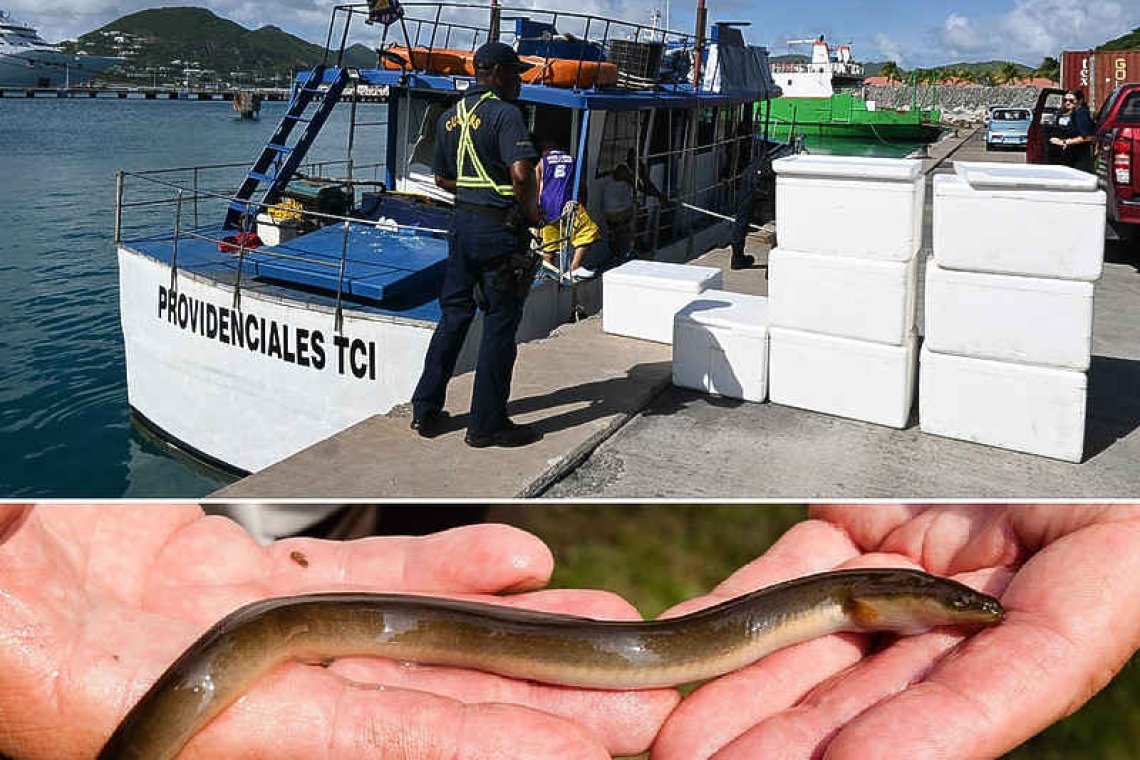PHILIPSBURG--A staggering 66,000 smuggled eels were seized from a vessel earlier this month during a joint operation by the Dutch Caribbean Coast Guard, Nature Foundation St. Maarten, and Customs. The freshwater eels, which can grow to four feet in length, had an estimated market value of US 37,000.
The eels, identified as the endangered American eel (Anguilla rostrata), were intercepted in Philipsburg, prompting a cross-border collaboration with officials from the Dominican Republic, the vessel’s point of origin. Efforts are now underway to return the eels to their natural habitats.
On December 5, the Coast Guard conducted routine inspections of a transporter vessel arriving from the Dominican Republic. During the operation, officers discovered over 25 boxes containing live eels, none of which were identified by species or accompanied by the necessary import permits.
Recognizing the potential for wildlife trafficking, they alerted Nature Foundation St, Maarten, which serves as the island’s authority for the Convention on International Trade in Endangered Species of Wild Fauna and Flora (CITES).
Nature Foundation immediately contacted the Dominican Republic’s CITES authority, which involved the national fisheries agency, CODOPESCA. The agency confirmed that the documentation provided by the crew was fraudulent and identified the eels as the endangered American eel, making the shipment an illegal operation under international law.
On December 6, two CODOPESCA representatives arrived in St. Maarten to assist in a full seizure of the illicit cargo. Along with the eels, an oxygen tank and other aquaculture equipment were confiscated.
Weighing 9.48 kilograms (20.7 pounds) in total, the live eels were transferred into the care of the Nature Foundation and monitored over the weekend by a dedicated team of CODOPESCA and Nature Foundation specialists. On December 9, the eels were shipped back to the Dominican Republic via air cargo for eventual release into freshwater and estuarine ecosystems.
While the eight crew members aboard the vessel were permitted to leave without prosecution, CODOPESCA issued a warning to St. Maarten officials, citing the island’s minimal entry and exit regulations for wildlife and animal products as a potential factor in its role as a trafficking hotspot.
According to CODOPESCA, illegal trade in Anguilla rostrata is widespread across the Caribbean, where poachers catch the eels in native rivers before smuggling them to East Asian aquaculture facilities via airports and harbours, including those in St. Maarten.
“While we are very proud of this joint accomplishment and the level of coordination displayed by all parties, this situation highlights a serious issue that has gone under the radar here,” stated a representative from Nature Foundation. “Based on past and ongoing conversations with international authorities, we believe that illegal wildlife trafficking – not just for eels but other species as well – is severely under-reported in St. Maarten. The need for more stringent trading regulations and intensive agent training has been made very clear by this incident.”
The international capture of Anguilla rostrata has surged in recent years, driven by high demand in East Asian food markets. With the depletion of European and Japanese eel populations, importers have increasingly turned to the American eel, fuelling overexploitation and earning the species an “Endangered” status on the IUCN Red List.
The illegal market for American eels has proliferated across the Caribbean, where they are valued between USD 3,250 and USD 3,950 per kilogram. CODOPESCA estimates that the seized shipment could have been worth upwards of USD 37,000 during the lucrative holiday season.
In response to this incident, officials from St. Maarten and CODOPESCA have committed to closer cooperation to intercept and reduce wildlife trafficking activities. However, authorities emphasize that community vigilance is essential. Residents and visitors are encouraged to report any suspicious activity involving wildlife around marinas, warehouses, or cargo areas.
Tips can be directed to the Coast Guard at 913 or via WhatsApp at +5999 5100913. Additionally, reports can be sent to the Nature Foundation via WhatsApp at (+1) 721-581-6365.







